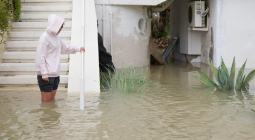Storm Darragh showed me how unprepared my family – and Britain – are for disaster
After just 12 hours without power, we were cold, isolated and facing the fact that everyday life is far more precarious than it seems
It was the cold that woke me up. Some time in the early hours of Saturday, as Storm Darragh blasted through our bit of rural Oxfordshire, the power lines had come down; by the time the central heating would otherwise have been firing up, the house was decidedly arctic.
The novelty of lighting candles, chopping firewood and making coffee on a sputtering camping stove carried everyone through the first few hours. But by mid afternoon frontier spirit was palpably waning, along with everyone’s phone batteries. By early evening there wasn’t much to do except agree that obviously we have it easy compared with Ukraine – now in its third icy winter of Russia using attacks on domestic power infrastructure as an extra weapon of war, which puts this minor domestic inconvenience into perspective – and that our digitised lives have become quite madly, recklessly vulnerable to a sudden loss of power.
Nothing feels as dumb as smart tech in a blackout. Overnight we lost not only light, heat and the ability to do anything from bank transactions to checking email on the apps I normally use, but temporarily we also lost connection to the outside world. (Mobile signal only works at the end of our rural lane when boosted by the wifi hub, 4G is wildly patchy and even our old-school cordless landline dies without power.) Life, in short, went analogue. Though we were thankfully reconnected on Saturday night, as of Monday morning 100,000 households had gone two nights and counting without power – no joke for the old, frail or ill-prepared.
Emma Pinchbeck, the chief executive of the independent Climate Change Committee, which advises government, warns that Britain is nowhere near ready for the chaos that shifting weather patterns could bring. Too much of our essential infrastructure wasn’t built to withstand the conditions seen last weekend, which implies more power outages and more disrupted travel. We’re behind on flood defences, and are still inexplicably building houses on flood plains despite the clue being very much in the name (don’t be surprised if flood risk becomes the new frontier for nimby arguments against housebuilding in 2025, not all of them justified). But we’re also unprepared for freak hot summers leaving city dwellers sweltering in overheated flats. The government’s most recent climate risk assessment talks ominously of cascading failures, where one bit of toppling infrastructure crashes into the next: a power cut affecting water treatment facilities knocking out fresh water supplies for days, say, as happened in East Sussex two years ago during Storm Eunice.
But climate isn’t the only growing obstacle to keeping the power on. In September 2022, a series of underwater explosions hit the Nord Stream gas pipeline off the Danish coast; a month later, the undersea cables supplying Shetland with internet were mysteriously damaged. Sabotage and cyber-attacks could all too easily be used to start a literal cold war, in which Russia or other hostile actors hold a shivering west to ransom over its insatiable need for heat, light and wifi. Think of the CrowdStrike debacle last summer – when a rogue update to antivirus software led to planes being grounded, bank transactions frozen and hospitals cancelling procedures – to imagine the potential for causing havoc, except this time with an added layer of panic triggered by feeling actively under attack.
Finland, Denmark, Norway and Sweden – all countries whose geography puts them on the frontline – have issued advice to citizens on stockpiling enough tinned food, water and essential medicines to outlast a three-day emergency. In Britain, where parts of Whitehall are still haunted by memories of Francis Maude blithely suggesting everyone keep a jerry can of petrol handy during a threatened 2012 fuel strike, talk of national resilience still feels at best a bit Dad’s Army and at worst like a ridiculous overreaction. I scoffed along with everyone else at last year’s official government advice to get a battery-powered radio and a stash of torches. But last weekend has brought out my inner prepper, if only for self-soothing purposes.
Though the capacity to stay warm, fed and vaguely aware of what’s happening in the outside world is never a bad thing in a crisis, dragging some ancient camping gear down from the loft isn’t really about being physically prepared. It’s more about mentally adjusting to the idea that the world is once again more precarious than it looks, and that even the most boring aspects of everyday life can’t simply be taken for granted. I just hope that in the parts of government that are meant to be listening to the likes of Emma Pinchbeck, the same penny has dropped.
Cover photo: By The Guardian



